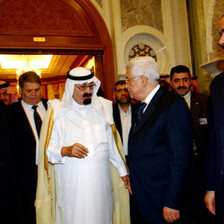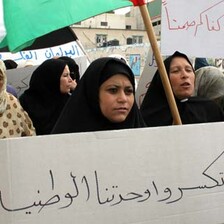Challenge 6 November 2006

America’s entrapment in Iraq creates a vacuum through the Middle East. The way out of that war has become the great question of US politics. Mid-term Congressional elections are due on November 7, 2006, but whatever the result, President George W. Bush will be a lame duck. If he boldly signals a change of direction (for example, by firing Defense Secretary Donald Rumsfeld), he will lose all credibility. On the other hand, if he doggedly “stays the course,” he will appear as a man out of touch with reality, unfit to lead his nation or the world. Either way, Bush’s lot will be that of the leaders his policy helped bring down: Asnar in Spain, Berlusconi in Italy, Blair in Britain.
As long as America is paralyzed, very little can change here. In Lebanon, to be sure, the recent war damaged Hezbollah’s autonomy. But on the major question, the Israeli-Palestinian conflict, we can only see years of deep freeze ahead.
The trouble is that the conflict cannot wait. Politics abhors a vacuum. Force rushes in to fill it. Consider Gaza, on the brink of armed chaos. Or the Lebanon War. No one planned it, no one wanted it. There was a vacuum.
America’s paralysis determines the agenda of Israeli Prime Minister Ehud Olmert. His campaign platform for the March elections included a program for “convergence” or “realignment” (in other words, withdrawal from settlements) in the West Bank. Now he has put that idea in cold storage and focuses instead on broadening his power base. The weak political profile of the US, combined with the narrowness of his party Kadima’s election victory and the chaotic state of his chief coalition partner, Labor, prevent him from leading any kind of strategic process.
Olmert need not bother to announce that he is freezing the situation. It is enough that he has fattened his coalition with the right-wing party Yisrael Beitenu (Israel Our Home). Its leader is Avigdor Lieberman, who was dismissed from Ariel Sharon’s government after voting against the Gaza disengagement. If Lieberman is in, the Palestinians are out: outside negotiating range. Apart from the 11 mandates he brings, giving Olmert 78 seats of 120, Lieberman is a red cloth in Arab faces. His program is racist. He would transfer Arab citizens to the Palestinian Authority. He would require a loyalty oath; those who refuse would be demoted to the status of residents and shorn of the right to vote. During the election campaign, Lieberman marketed himself as the strong man you don’t want to mess with. In this spirit, Olmert invented a “Ministry for Strategic Threats” and set him at its head. His function will be to growl at Arabs and Iranians.
Lieberman brings Olmert an additional dowry. Within the murky precincts of Israel’s right wing, the new minister seeks to diminish his former patron, Binyamin Netanyahu. The latter’s Likud sank to 12 mandates in the March elections, but after Lebanon opinion polls boosted Bibi again. Not only that: the Laborites are out of control. Some are likely to rebel when the budget comes up for a vote, and failure to pass it would obligate new elections. By bringing in Lieberman, Olmert, with a single blow, wards off that prospect while splitting the Right.
Although Labor’s social-minded left wing made a lot of noise against sitting in a government with Lieberman, Olmert’s gamble paid off. On October 29, Labor’s Central Committee decided by a firm majority to stay in the government. The message was clear: power over program.
America’s paralysis also determines events on the Palestinian side of the fence. In the absence of a program that offers any hope, there is no public pressure to restrain the more militant and radical forces in Hamas and Fatah. They are all the more dangerous within the context of the economic blockade imposed since the Hamas victory in January 2006. A quarter of the Palestinian workers, mostly in the public sector, have not been paid for the last eight months. The teachers have been on strike since the school year started. The European Union withholds the donated money because Hamas refuses to accept the three conditions set by the Quartet: recognition of Israel, condemnation of terrorism and the honoring of former agreements, such as the Oslo Accords. (For its part, Israel is illegally withholding tax money and customs duties that it has collected, under the terms of Oslo, for the PA.) The Fatah members are furious with Hamas for not accepting the Quartet’s conditions. Armed gangs are on the verge of civil war. Both sides fear this, but neither is willing to stand down. A mere $1.5 billion per year would keep them quiet, but the money isn’t there.
The Palestinian people is hostage to the West, which feels no obligation to support a government that refuses to oppose terrorism or recognize Israel. But the Palestinian people is also hostage to the movement it chose. Hamas ran in elections for the Palestinian Authority, although this is the creature of the Oslo Accords. True, the Accords tie the Palestinians to a bed of hard nails, allowing no hope for a viable state-Oslo keeps Palestine a charity case. Yet Hamas accepted this framework when it decided to run for office. It can hardly complain that the donor nations are withholding funds while it refuses to accept the terms under which the funds were donated.
The pro-western Arab states, such as Egypt and Qatar, have taken various initiatives, some in an attempt to get Hamas to accept the Quartet’s conditions, others aimed at dissolving the Hamas government and establishing a more moderate one. Opposing these efforts is Syria, which whispers to Hamas: “Don’t give in.” In return for using its influence to bring Hamas into an internal Palestinian agreement, Syria hopes to normalize relations with America and end international isolation. As ever, both sides are using the Palestinians for their own ends. Again, as ever, the tug-of-war will only deepen Palestinian suffering.
The Israeli-Palestinian conflict suffers from absence of leadership. The Americans will be out of the running for quite some time. The Israeli government has put its own longevity ahead of everything else. It will wage the struggle in high or low gear, as circumstances dictate, but without any program for substantial change. Meanwhile, the PA has not found a formula that would enable it at least to pay salaries and survive from month to month.
The mid-term US elections offer the American people a chance for soul-searching after six years of Republican rule, but we should not pin our hopes too high. No fundamental change is in the offing. Both major parties serve the wealthy. The foundations of this regime are not in dispute, rather only immediate policy in the narrowest sense. Should goals be accomplished by military might or diplomacy? Should taxes be increased or cut? Such are the points of contention between Republicans and Democrats.
The problem of worldwide poverty; genocidal wars in Africa; the diseases afflicting millions; lack of education; environmental damage; ethnic and national conflicts, ours included-these items don’t enter the American debate. By capitalist lights, they are an incurable part of the human condition.
Nevertheless, between America’s failure to lead the world and, on the other hand, the dangerous adventures of political Islam, there is a third way. There are people who call for a radical change in social and political priorities, for a just and equal division of the world’s resources, for the canceling of special privileges. This agenda seeks to solve national and ethnic conflicts by overcoming their root causes. The agenda exists, even if its adherents are few. Our task is to forge a leadership that can implement it.
CHALLENGE is a bi-monthly leftist magazine focusing on the Israeli-Palestinian conflict within a global context. Published in Jaffa by Arabs and Jews, it features political analysis, investigative reporting, interviews, eye-witness reports, gender studies, arts, and more. This article first appeared in Challenge #100 and is reprinted with permission.
Related Links





